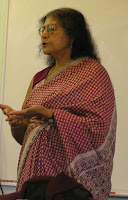“It’s no longer enough to think about power in a top-down manner – the people on whom, and in relation to whom, power gets exercised are an indispensable part of it,” said Sheila Jasanoff, explaining her theory of civic epistemology.
Jasanoff, professor of science and technology studies at Harvard University took to the floor to give the second in the new STEPS Centre seminar series and promptly hung a huge question mark over conceptions of knowledge, power, politics, expertise, objectivity and democracy.
“Civic epistemology allows me to get at culture, and more specifically political culture. It helps me understand why there are do often differences in agenda setting, social priority setting, ways in which conflicts resolved, differences between what societies say they are concerned about and what happens,” said Jasanoff.
And she firmly believes you can take civic epistemology away from regulatory culture and put it into other contexts. It could be used to compare what happened in the wake of three post-disaster inquiries for instance: 9/11 in US, BSE in UK and Bhopal in India, for example, and went on to explain how.
To take ‘knowledge society’ seriously it has to be politicised, said Jasanoff. ‘Knowledge society’ must be thought of as a political as well as a sociological concept – not only as a class of people who produce knowledge, but of states and state-like institutions where knowledge is made, often as part of government.
So if we are going to politicise ‘knowledge society’, we have to shift our thoughts from the governors to the governed – “we have to rethink democratic theory,” she explained. This means rethinking what the labels of normal political science – representation, voice – mean.
If states are going to depend on instruments of science and technology then citizens have to be able to recognise the demonstrations of this knowledge by the state. It takes an “appropriately reasoning citizen” to carry out public understanding of science in a democratic way, she said.
But among the problems of public understanding of science framework, is the deficit model, said Jasanoff: by saying pub doesn’t understand science you are representing the public as lacking in appropriate reasoning and competence.
So how do you measure public understanding of science or law, both of which are very privileged forms of knowledge? Civic epistemology is a partial answer, said Jasanoff.
To explore her theory further Jasanoff has done a comparative study of political cultures looking at the differences between the US, UK and Germany, the stages of decision making and how knowledge figures at each stage. She has also compared ways of public-knowledge-making, public accountability, demonstration, objectivity and expertise.
Jasanoff is at pains to point out that she is not trying to characterise or label the three countries in the terms of her results, but to throw up a potential way of “making the world”.
In the area of expertise, for instance, Jasanoff has come up with what she terms the ‘three bodies’ approach: an expert can be a sole expert advisor; a collective body, such as a committee; or a formal reservoir of knowledge bodies that experts draw on.
The UK government, for example, has come up with code of practice on how to be a science advisor. And that UK policy response coincides with the results of Jasanoff’s comparative study that in the UK emphasis is on the expert.
She believes her comparative analysis of expertise could help in giving guidance on policy advice in this area, that the analysis does have practical applications.
In her comparative study she looked at how each country viewed objectivity and if it is viewed as being “from somewhere, everywhere or nowhere”. If knowledge is a place, so objectivity could mean being no place.
For example, she found that the US has a preference to believe the way to achieve objectivity is to take all interests out: “In the US the idea of and ‘Eden before the fall’ where perfect knowledge is attained is still a dominant idea and underlies a lot of American thinking,” said Jasanoff.
She believes we can see civic epistemology at work in the world in the words and actions of political agents, of citizens and of the media.
“Civic epistemology is at our fingertips and toe-tips – it is not something we have to look hard for,” said Jasanoff. “To me the whole interest of looking at this stuff is that it is an open-ended set of questions.”
She concluded with a series of on-going questions an speculations, among them whether civic epistemology only meaningfully constitutes at the level of the statistics; how to deal with variations within states; are variations cross-national, or is related to categories, states, social movements and corporations; and how many civic epistemologies are there?
